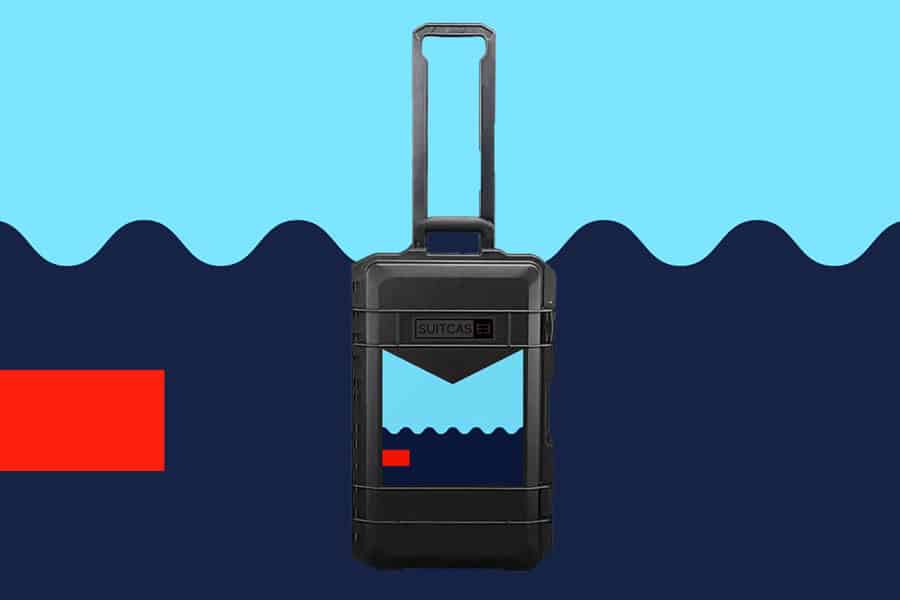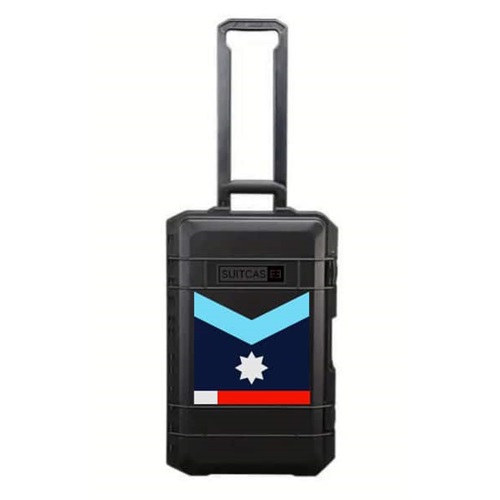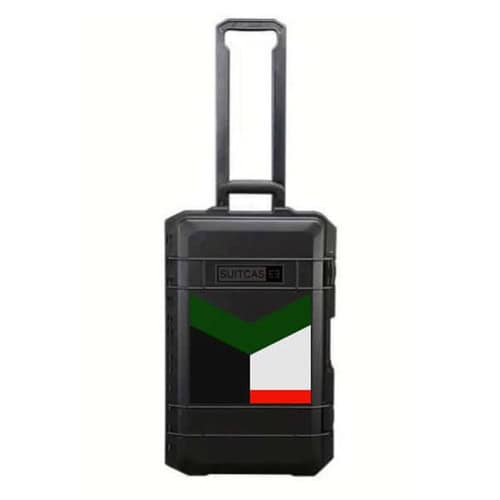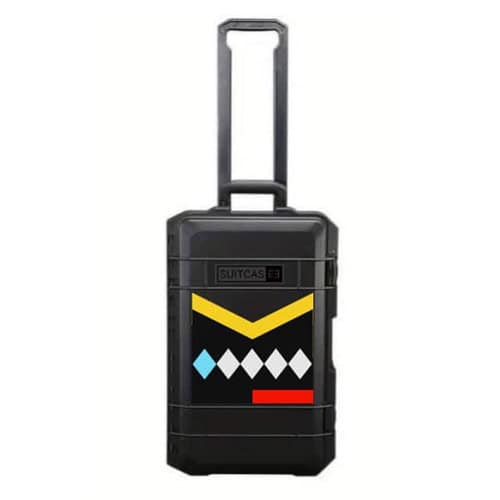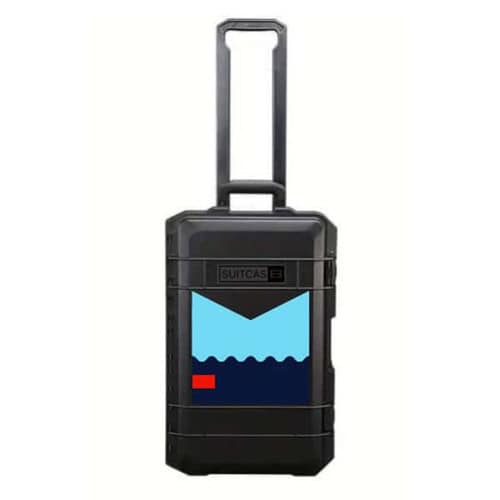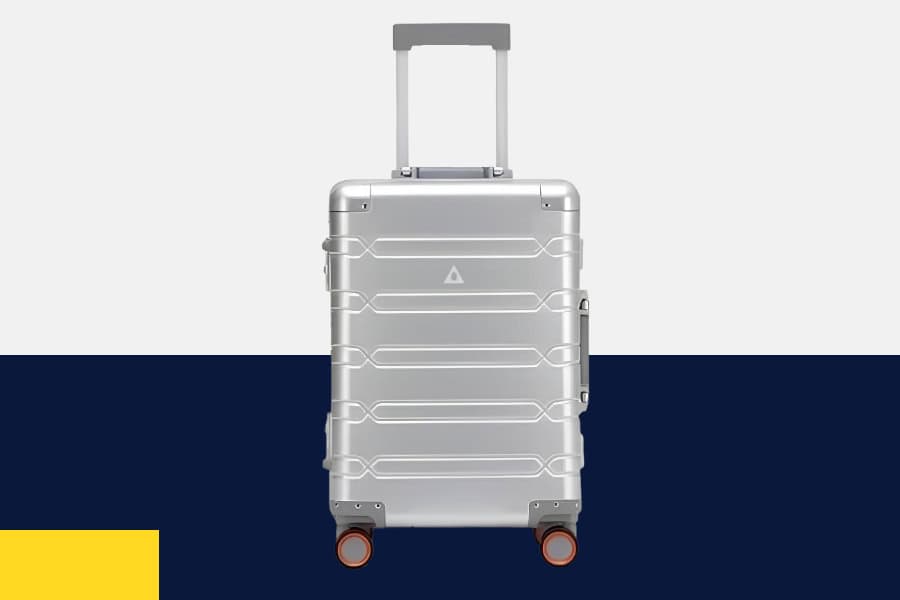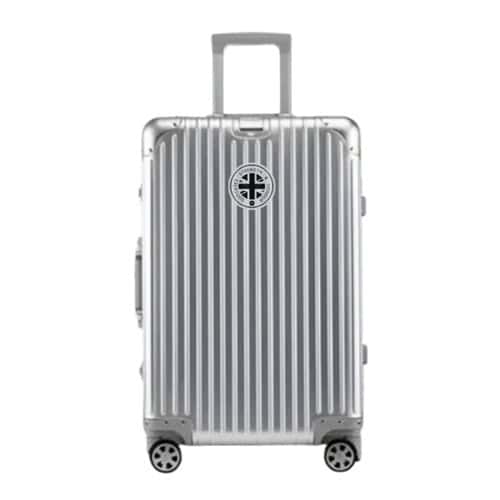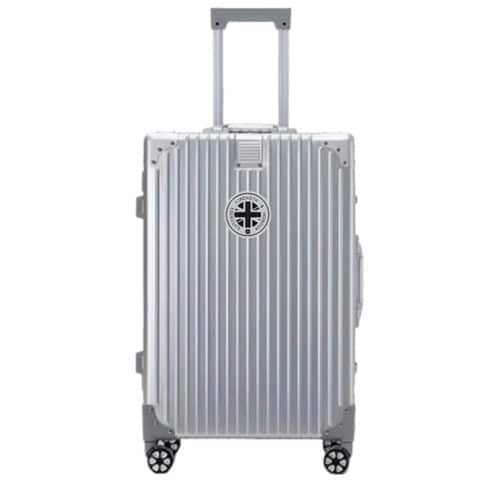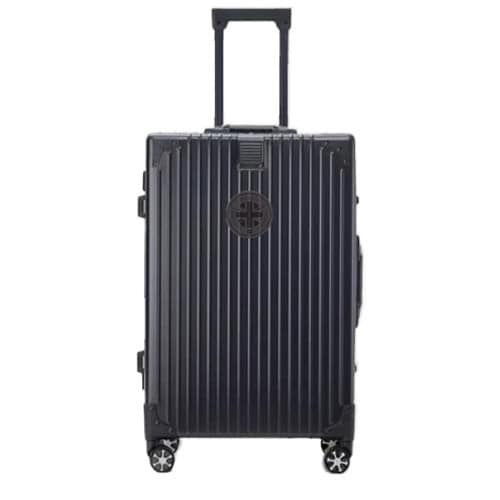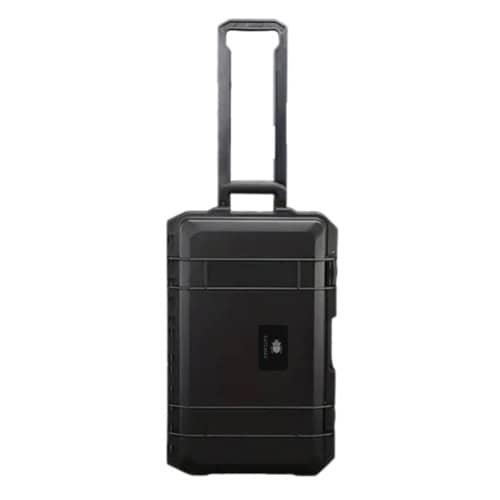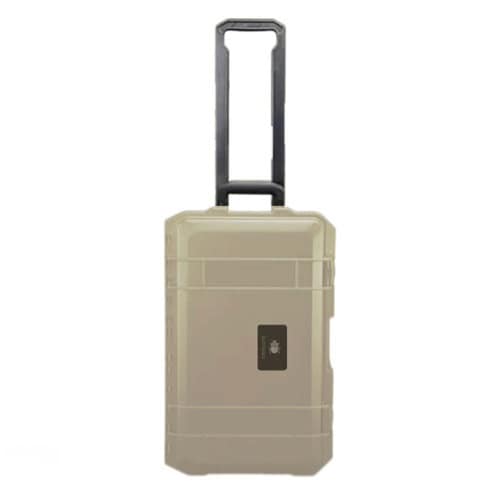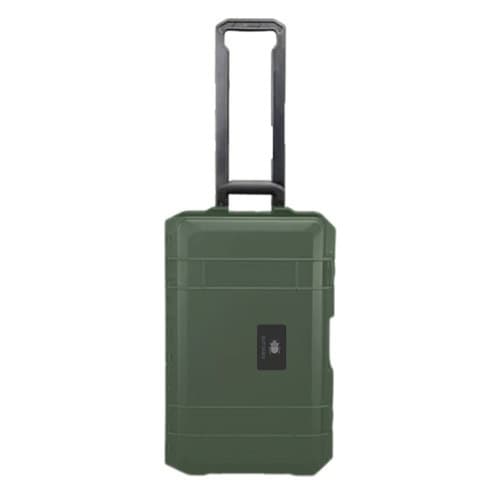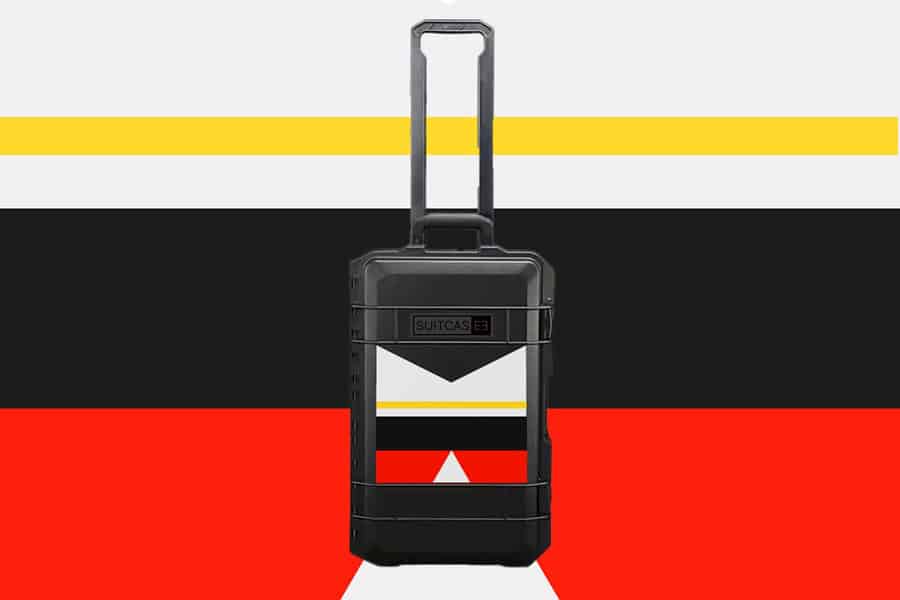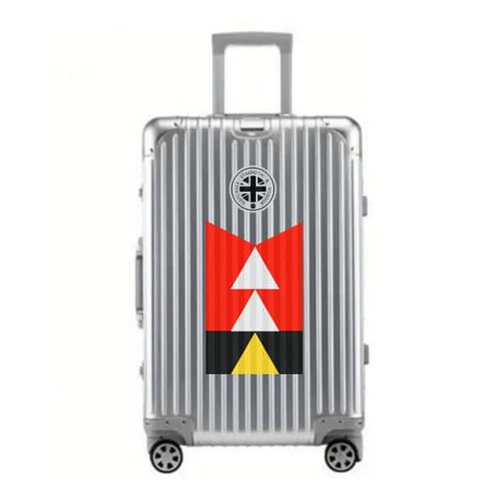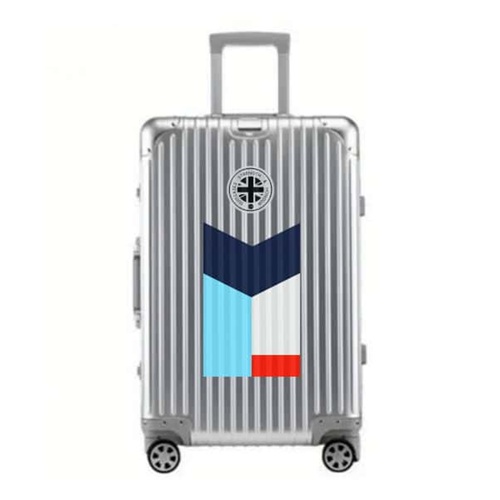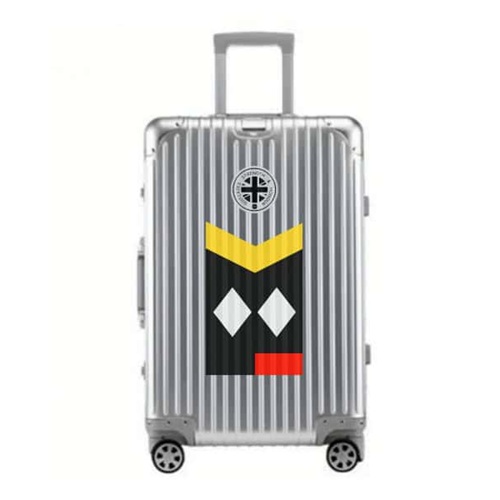Essential Sustainable Travel Tips
Strength & Honour
Stay tuned for our eco-friendly luggage rental services
Embrace a Greener Journey with Practical Advice for Sustainable Travel
SUITCASEƎ
In an era where environmental awareness is paramount, sustainable travel has become more than just a trend; it's a necessity. Eco-conscious explorers are increasingly seeking ways to minimise their carbon footprint while still indulging in the joys of travel. This guide presents valuable tips and insights to help you travel sustainably, ensuring that each adventure leaves a positive impact on the planet.
Sustainable Travel Tips at a Glance
Use Eco-friendly Transport
Support Locals
Pack Light
Use Reusables
Conserve Water
Respect Wildlife and Nature
Offset Carbon Footprint
Choose Sustainable Stays
Learn Local Cultures
Be Eco-conscious
Pick Responsible Wildlife Tourism
Volunteer While Travelling
Reduce Energy Use
Join Conservation Efforts
Advocate for Sustainability
Plan Wisely
Conclusion
FAQs
The Importance of Sustainable Travel
SUITCASEƎ
Sustainable travel refers to making responsible choices that benefit local communities, preserve natural resources, and minimise environmental impact. By adopting sustainable practices, travellers can contribute to the protection of our planet while enriching their own experiences. Here are some essential tips for eco-conscious exploration.
Choose Eco-Friendly Transportation
When it comes to sustainable travel, the choices we make regarding transportation play a pivotal role in minimising our carbon footprint and contributing to environmental preservation. Transportation is one of the largest contributors to greenhouse gas emissions, primarily due to the reliance on fossil fuels. Therefore, opting for eco-friendly modes of transport is essential for responsible travellers who wish to lessen their impact while exploring new destinations.
Public Transport
Utilising public transport systems—such as buses, trams, and trains—can significantly reduce individual carbon emissions. Public transport is generally more energy-efficient per passenger than private vehicles, as it consolidates many travellers into a single vehicle. In urban areas, for instance, buses and trains can transport dozens or even hundreds of people at once, thereby decreasing the overall number of vehicles on the road and reducing traffic congestion.
Additionally, many cities are investing in expanding and improving their public transport networks to encourage its use. Travellers can take advantage of these systems by purchasing day passes or travel cards, which offer unlimited rides within a certain time frame. Not only does this help the environment, but it also allows for a more immersive experience with the local culture, enabling travellers to interact with residents and gain insight into daily life.
Cycling
For shorter distances, cycling offers an excellent eco-friendly alternative. Many cities around the world are becoming increasingly bike-friendly, with dedicated cycling lanes and bike-sharing programmes that allow visitors to rent bicycles easily. Cycling is not only a low-impact mode of transportation; it also provides a unique way to explore destinations at a more leisurely pace. Travellers can enjoy scenic routes, discover hidden gems, and appreciate the surroundings in ways that they might miss when travelling by car or bus.
In addition to being environmentally friendly, cycling promotes physical health and well-being, making it a win-win choice for both the traveller and the planet. Many travel companies now offer cycling tours that provide guided experiences through picturesque landscapes or urban environments, further enhancing the appeal of this mode of transport.
Walking
One of the simplest yet most effective ways to reduce your carbon footprint is to walk whenever possible. Walking not only has zero emissions but also offers an intimate way to connect with your destination. Many cities are designed to be pedestrian-friendly, with vibrant streetscapes filled with shops, cafes, and cultural landmarks. By exploring on foot, travellers can engage more deeply with their surroundings, absorb the local atmosphere, and discover off-the-beaten-path attractions that may not be accessible by vehicle.
Walking tours are becoming increasingly popular, offering structured opportunities for travellers to learn about the history and culture of a place while enjoying the physical benefits of walking. Many cities now have guided walking tours that highlight unique aspects of local life, from culinary delights to historic sites.
Trains Over Flights
When long-distance travel is necessary, consider taking trains or buses instead of flights. Train travel is often more sustainable than flying because trains generally emit less carbon per passenger mile. Many countries in Europe and Asia boast efficient rail networks that connect major cities and scenic regions, making train journeys not only eco-friendly but also enjoyable experiences filled with beautiful landscapes.
If flying is unavoidable due to time constraints or geographical limitations, opting for direct flights can further reduce emissions. Take-off and landing are the most fuel-intensive stages of flying; thus, a direct flight typically results in fewer emissions compared to connecting flights that require additional landings and take-offs. It’s also worth checking airlines that prioritise sustainability; many are investing in more fuel-efficient aircraft and carbon offset programmes to mitigate their environmental impact.
Supporting Local Economies
Supporting local economies is a vital aspect of sustainable travel that fosters community resilience, promotes cultural preservation, and reduces environmental impact. By consciously choosing to purchase goods and services from local businesses, travellers can play an influential role in the economic health of the regions they visit. This not only enhances the authenticity of the travel experience but also ensures that the benefits of tourism are felt by the local population rather than large, often distant corporations.
Stimulating Local Economies
When travellers buy from local vendors, dine at neighbourhood restaurants, or stay in family-run accommodations, they inject money directly into the local economy. This influx of cash helps to create jobs and sustain livelihoods for local residents, from artisans and farmers to tour guides and hospitality staff. Many communities rely on tourism as a primary source of income; therefore, when visitors make a conscious effort to support these establishments, they contribute to the overall economic stability of the area.
Local businesses often reinvest their profits back into the community, funding schools, infrastructure, and community projects that enhance the quality of life for residents. This creates a virtuous cycle in which supporting local economies leads to improved public services and community well-being, ultimately benefiting both residents and visitors alike.
Reducing Carbon Footprint
In addition to stimulating local economies, purchasing local goods and services significantly reduces the carbon footprint associated with transporting products over long distances. When travellers buy locally produced food, crafts, or souvenirs, they help eliminate the need for extensive transportation networks that contribute to greenhouse gas emissions.
For example, dining at a restaurant that sources ingredients from local farms not only supports regional agriculture but also minimises the carbon emissions linked to transporting food over vast distances. Similarly, buying handmade crafts from local artisans reduces reliance on mass-produced goods that often travel thousands of miles before reaching consumers. This conscious choice not only benefits the environment but also allows travellers to enjoy fresher, more authentic products that reflect the culture and heritage of the region.
Choosing Locally-Owned Accommodation
Opting for locally-owned accommodations—such as bed-and-breakfasts, guesthouses, or boutique hotels—can have a profound impact on the local economy. These establishments typically employ local staff and source supplies from nearby businesses, further supporting the community. Additionally, many small accommodations offer unique experiences that larger hotel chains cannot replicate, such as personalised service and insights into local culture.
By staying in locally-owned properties, travellers often find themselves in more authentic settings that reflect the character of the destination. This intimate connection with the surroundings can lead to richer travel experiences, allowing visitors to engage with their hosts and learn about traditions, customs, and lesser-known attractions.
Dining at Local Restaurants
Food is a significant part of any travel experience, and choosing to eat at local restaurants allows travellers to savour regional flavours while supporting the community. Local eateries often feature seasonal menus based on fresh ingredients sourced from nearby farmers and markets. This not only guarantees a more authentic culinary experience but also promotes sustainable agricultural practices by encouraging the consumption of locally grown produce.
Moreover, dining in local establishments fosters social interactions with residents, providing opportunities for cultural exchange and understanding. Travellers can engage with chefs and staff who are passionate about their craft and eager to share stories about the food culture in their region.
Shopping at Local Markets
Visiting local markets is another excellent way to support local economies while enjoying a vibrant shopping experience. Markets often showcase a variety of products, from fresh produce and artisanal food items to handmade crafts and traditional clothing. By purchasing items directly from producers or artisans at these markets, travellers can ensure that their money is going directly to those who create it.
Shopping locally also allows travellers to gain insight into the cultural significance of various products. Many artisans are happy to share their stories and techniques, offering a deeper understanding of the craftsmanship involved in creating their goods. This personal connection adds value to each purchase and encourages a greater appreciation for local traditions.
Travel Smart, Travel Stylish
Pack Light
Packing light is an essential principle of sustainable travel that benefits both the environment and the traveller's experience. The act of bringing only what you need not only simplifies the travel process but also contributes to reducing the overall weight of the aircraft, which can lead to lower fuel consumption and, consequently, reduced carbon emissions. By adopting a minimalist approach to packing, travellers can enjoy a more efficient and eco-friendly journey while maximising their enjoyment of the destination.
Environmental Impact of Packing Light
Every kilogram counts when it comes to air travel. Airlines are increasingly aware that reducing weight on their planes can significantly lower fuel consumption. Heavier planes require more fuel to operate, leading to increased greenhouse gas emissions. By packing light, travellers contribute to this effort by helping to minimise the overall weight of the aircraft, which ultimately supports sustainability in the aviation industry.
Moreover, the environmental impact extends beyond just air travel. When packing light for other forms of transportation, such as buses or trains, the principle remains the same: less weight generally means lower fuel usage and emissions. This commitment to minimalism can have a ripple effect throughout the entire travel experience.
Benefits of Travelling Light
- Ease and Convenience: One of the most immediate benefits of packing light is the ease it brings to your travel experience. Navigating airports, train stations, and city streets becomes significantly easier when you are not burdened by heavy luggage. You can move swiftly from one location to another, whether it’s catching a connecting flight, hopping on public transport, or exploring a new city on foot. Packing light also means less time spent waiting at baggage claim and fewer worries about lost luggage.
- Flexibility: Travelling with fewer belongings allows for greater flexibility in your itinerary. With lightweight luggage, you can easily adapt to changes in your travel plans or explore spontaneous opportunities that arise along the way. This flexibility can enhance your overall experience, enabling you to engage more fully with your surroundings.
- Cost Savings: Many airlines charge extra fees for checked baggage or for exceeding weight limits, which can add significantly to your travel expenses. By packing light, you can avoid these additional costs altogether. Additionally, if you choose to travel by train or bus, many operators have restrictions on luggage size and weight; travelling light ensures that you comply with these regulations without hassle.
- Mindful Consumption: Adopting a minimalist packing approach encourages mindful consumption and decision-making about what you truly need for your trip. It prompts you to evaluate each item you plan to bring and consider its necessity and utility. This awareness can lead to more thoughtful purchases in general and may influence your choices in daily life beyond travel.
Creating a Well-Planned Packing List
A well-planned packing list is key to ensuring that you bring only what you need while avoiding unnecessary items that could weigh you down. Here are some strategies for creating an effective packing list:
- Research Your Destination: Understanding the climate, culture, and activities available at your destination will help you tailor your packing list accordingly. For instance, if you’re headed to a tropical paradise, lightweight clothing and swimwear will take precedence over heavy jackets or winter gear. Similarly, knowing whether your accommodation offers laundry facilities can influence how much clothing you pack.
- Choose Versatile Clothing: Opt for clothing items that can be mixed and matched to create different outfits. Neutral colours and adaptable styles allow for greater variety without taking up unnecessary space in your suitcase. Additionally, consider fabrics that are wrinkle-resistant and quick-drying, which can be particularly useful for travel.
- Limit Footwear: Shoes can be one of the heaviest items in your luggage. Aim to bring no more than two or three pairs that serve multiple purposes—such as comfortable walking shoes for exploration and a pair of dressier shoes for evenings out. Wearing your bulkiest pair during transit can also save space in your luggage.
- Utilise Packing Cubes or Compression Bags: Packing cubes or compression bags can help organise your belongings efficiently while allowing you to maximise space within your suitcase. These tools make it easier to locate specific items without rummaging through everything, further streamlining your travel experience.
- Consider Travel-Sized Toiletries: Instead of bringing full-sized toiletries, invest in travel-sized containers or refillable bottles for liquids. Many hotels also provide basic toiletries, so check ahead to see what will be available at your accommodation and adjust your packing list accordingly.
- Leave Room for Souvenirs: If you're planning to shop during your travels, leave some space in your luggage for any souvenirs or gifts you may want to bring back home. This not only avoids overpacking initially but also gives you flexibility in accommodating new items.
Products
Expedition Series Bestsellers
Use Reusable Items
In the quest for sustainable travel, one of the most impactful changes you can make is to incorporate reusable items into your travel routine. Opting for reusable alternatives to single-use plastics significantly reduces waste and pollution, contributing to a healthier environment and promoting sustainable practices. This simple yet effective approach not only helps protect our planet but also enhances your travel experience by encouraging mindful consumption and reducing reliance on disposable products.
The Environmental Impact of Single-Use Plastics
Single-use plastics—such as water bottles, cutlery, shopping bags, and coffee cups—are among the most pervasive forms of waste generated globally. These items are designed to be used once and then discarded, leading to enormous quantities of plastic waste that often end up in landfills or, worse, in our oceans. Plastic pollution poses a significant threat to wildlife, marine ecosystems, and human health, as it takes hundreds of years to decompose.
By choosing reusable items, travellers can play an active role in combating plastic pollution. According to studies, a reusable water bottle can eliminate the need for hundreds of single-use plastic bottles during a single trip, while a reusable shopping bag can prevent countless plastic bags from entering the waste stream. Embracing these sustainable alternatives is a powerful way to minimise your ecological footprint and promote environmental stewardship.
Key Reusable Items to Consider
- Reusable Water Bottles: Carrying a reusable water bottle is one of the simplest yet most effective ways to reduce plastic consumption while travelling. Not only does it help eliminate the need for single-use bottled water, but it also encourages you to stay hydrated throughout your journey. Many destinations now offer refill stations in public areas, making it easy to top up your bottle. Additionally, some companies produce insulated bottles that keep beverages cold or hot for extended periods, adding further value to this essential item.
- Reusable Cutlery and Straws: Packing a set of reusable cutlery and straws can significantly reduce the need for disposable utensils when dining on the go. Many food vendors and take-away restaurants still provide plastic cutlery and straws, which contribute to plastic waste. By bringing your own stainless steel or bamboo cutlery and reusable straws, you can enjoy meals responsibly while making a statement about sustainability. Some brands even offer compact sets that fit easily into your bag, ensuring convenience without sacrificing environmental responsibility.
- Reusable Coffee Cups: For coffee lovers, investing in a reusable coffee cup is an excellent way to cut down on waste while enjoying your favourite beverage. Many cafes offer discounts for customers who bring their own cups, providing an incentive to make the switch. Additionally, reusable cups come in various materials—such as stainless steel, glass, or silicone—and sizes to suit your preferences. Some designs even feature insulation to keep beverages hot or cold longer, making them perfect for travel.
- Reusable Shopping Bags: Whether you're visiting local markets or shopping for souvenirs, carrying a reusable shopping bag is essential for reducing plastic bag usage. Many regions have implemented bans or fees on single-use plastic bags, making it increasingly important to have a reliable alternative on hand. Reusable shopping bags are often sturdier than their disposable counterparts and can be folded into compact sizes for easy transport. Opt for bags made from eco-friendly materials that align with your commitment to sustainability.
- Cloth Napkins or Beeswax Wraps: For those who pack snacks or meals during their travels, consider bringing cloth napkins or beeswax wraps as eco-friendly alternatives to paper towels or plastic wraps. Cloth napkins are easily washable and can be reused multiple times, while beeswax wraps can be used to cover food items without resorting to plastic cling film. Both options contribute to reducing waste while providing practical solutions for food storage and cleanliness on the go.
Tips for Implementing Reusable Items in Your Travel Routine
- Plan Ahead: Before your trip, make a checklist of reusable items you want to bring along. This preparation ensures that you don’t forget any essentials and helps you build sustainable habits as part of your travel routine.
- Choose Multi-Functional Items: When selecting reusable products, look for items that serve multiple purposes. For example, a collapsible coffee cup can double as a water bottle, while a sturdy shopping bag can also serve as a beach tote or laundry bag.
- Educate Yourself on Local Recycling Practices: Not all destinations manage waste in the same way; understanding local recycling practices can help you dispose of your reusables responsibly if they become damaged or worn during your travels.
- Lead by Example: Encourage fellow travellers or locals to embrace reusable items by sharing your experiences and the benefits of sustainable practices. Spreading awareness can inspire others to make environmentally conscious choices.
- Commit to Continuous Improvement: As you travel more sustainably, continually assess your habits and seek new ways to reduce waste in your daily life beyond travel. Consider implementing additional practices at home that align with your commitment to sustainability.
Travel Smart, Travel Stylish
Be Mindful of Water Usage
In the context of sustainable travel, being mindful of water usage is a crucial practice that can greatly impact both local communities and the environment. Water is a precious resource that is often taken for granted, yet in many regions around the world, it is scarce and under significant stress due to factors like climate change, population growth, and over-extraction. As travellers, our actions can either exacerbate or alleviate these challenges. By becoming conscious of our water consumption, we can contribute to the responsible stewardship of this vital resource while also respecting the needs of local populations who may rely on limited water supplies.
Understanding Global Water Scarcity
Water scarcity affects billions of people globally and is particularly acute in arid and semi-arid regions, where access to clean and reliable water sources is limited. Many popular travel destinations—including parts of Southern Europe, the Middle East, and various islands—face significant water shortages, especially during peak tourist seasons when demand surges. In these areas, the influx of visitors can strain local water resources, leading to shortages for residents and ecosystems alike.
As tourists, we have the opportunity—and responsibility—to mitigate our impact on these fragile water systems. By adopting more sustainable water practices while travelling, we can help preserve this essential resource for both current and future generations.
Practical Strategies for Reducing Water Usage
- Take Shorter Showers: One of the most effective ways to conserve water while travelling is by taking shorter showers. Standard showers can use anywhere from 2.1 to 5 gallons of water per minute, depending on the showerhead's flow rate. By reducing your shower time to just a few minutes—ideally under five—you can significantly cut down on your water consumption. Consider setting a timer or using a waterproof watch to track your shower duration. This simple adjustment not only conserves water but also helps you become mindful of your overall resource usage.
- Reuse Towels and Linens: In many hotels, you will find signs encouraging guests to reuse towels and linens during their stay. This practice helps reduce the frequency of laundry cycles, which consume large amounts of water and energy. When staying at accommodations, consider hanging up towels that are still clean rather than sending them for laundering after each use. Similarly, if you are staying longer than a day, opt to reuse bed linens instead of having them changed daily. This small act can collectively lead to substantial water savings across multiple guests.
- Limit Water Use in Activities: Be conscious of your water use during various activities while travelling. For example, when washing hands or brushing teeth, turn off the tap while lathering soap or brushing, as this can save gallons of water daily. When using public restrooms, inform facilities if you notice leaky taps or toilets; such issues can waste significant amounts of water if left unaddressed.
- Choose Water-Efficient Accommodation: When selecting where to stay, consider choosing accommodations that prioritise water conservation as part of their sustainability practices. Many eco-friendly hotels implement systems designed to reduce water usage—such as low-flow toilets, rainwater harvesting systems, and greywater recycling. Researching and supporting these establishments not only aligns with sustainable travel values but also sends a message to the hospitality industry about the importance of resource conservation.
- Participate in Local Water Conservation Initiatives: Some destinations offer opportunities for travellers to engage in local water conservation initiatives or community projects focused on sustainable water management. Look for volunteer programmes or community workshops that educate visitors about local water challenges and provide actionable solutions. Participating in these initiatives not only contributes to local efforts but also deepens your understanding of the critical issues surrounding water availability in that region.
- Educate Yourself on Local Water Issues: Before travelling to a new destination, take time to research its specific water challenges and conservation efforts. Understanding the context of water scarcity in the area enhances your appreciation for the local culture and helps you engage more meaningfully with residents. This knowledge can guide your choices regarding accommodation, activities, and overall behaviour during your stay.
- Support Local Conservation Efforts: Whenever possible, consider supporting local organisations dedicated to water conservation efforts through donations or participation in their programmes. Many communities are working diligently to address the challenges posed by water scarcity through innovative solutions, education, and advocacy. Contributing to these initiatives can amplify your impact while fostering connections with local communities.
Respect Wildlife and Natural Areas
Respecting wildlife and natural areas is a fundamental principle of sustainable travel that fosters the conservation of biodiversity and the preservation of fragile ecosystems. As travellers, we have the privilege and responsibility to explore the beauty of nature while ensuring that our actions do not harm the environments and communities we visit. By understanding the importance of protecting wildlife and their habitats, we can contribute to the longevity of these precious ecosystems for future generations.
The Importance of Wildlife Conservation
Wildlife plays a crucial role in maintaining ecological balance and supporting the health of ecosystems. Each species—whether it’s a predator, prey, pollinator, or decomposer—has a specific function that contributes to the intricate web of life. However, many species are currently threatened by habitat loss, climate change, pollution, and human encroachment. Sustainable travel practices can help mitigate these threats by promoting responsible behaviour and fostering awareness of the challenges faced by wildlife.
When we respect wildlife and natural areas, we contribute to conservation efforts that ensure the survival of various species and their habitats. This not only benefits the environment but also enhances our own travel experiences by allowing us to witness nature in its most authentic form.
Practical Strategies for Respecting Wildlife and Natural Areas
- Stay on Designated Paths: When hiking or exploring natural areas, it is essential to stick to designated trails and paths. Off-trail hiking can lead to soil erosion, damage to native vegetation, and disruption of wildlife habitats. Many ecosystems are delicate and can take years or even decades to recover from disturbances. Staying on established paths helps protect these fragile environments and ensures that you leave no trace of your visit.
- Observe Wildlife from a Safe Distance: While it may be tempting to get up close to animals for photographs or a better view, it is crucial to observe wildlife from a safe distance. Approaching animals can cause stress and disrupt their natural behaviours, such as feeding, mating, or raising their young. Many animals may perceive humans as threats, leading them to flee or react defensively.
- Avoid Feeding Wildlife: Feeding wildlife can have detrimental effects on both animals and ecosystems. When animals become reliant on human-provided food sources, it alters their natural behaviour and can lead to health problems. For instance, some species may become aggressive in seeking food from humans or lose their ability to forage for themselves.
- Dispose of Waste Properly: One of the simplest yet most impactful ways to respect natural areas is to dispose of waste responsibly. Always carry out what you carry in—this includes not only your trash but also any leftover food that could attract wildlife or disrupt local ecosystems. Many parks have designated waste disposal areas or recycling bins; utilise these facilities when available.
- Educate Yourself About Local Ecosystems: Before embarking on your journey, take time to learn about the specific ecosystems you will be visiting. Understanding the flora and fauna native to the area can enhance your appreciation for the environment and inform your decisions while exploring. Many parks offer educational resources, ranger-led programs, or visitor centres where you can gather valuable insights about local conservation efforts.
- Participate in Conservation Activities: Many destinations offer opportunities for travellers to engage in conservation activities that support wildlife protection and habitat restoration. Look for volunteer programmes or guided eco-tours that focus on environmental education and conservation efforts. Participating in these activities allows you to contribute meaningfully to local initiatives while gaining firsthand experience of the challenges faced by wildlife.
- Follow Local Regulations and Guidelines: Every natural area has its own set of regulations designed to protect wildlife and preserve habitats. Familiarise yourself with these rules before your visit, as they may include guidelines on trail use, wildlife observation distances, camping restrictions, and more. Following these regulations not only ensures your safety but also demonstrates respect for the environment and local communities.
Travel Smart, Travel Stylish
Offset Your Carbon Footprint
As global awareness of climate change and its impacts continues to grow, the importance of offsetting our carbon footprint has become increasingly critical, particularly for those of us who travel. Travel, especially air travel, contributes significantly to greenhouse gas emissions, which are a major driver of climate change. One way to take responsibility for our environmental impact is by investing in carbon offset programmes. These initiatives not only help mitigate the emissions generated during our travels but also support projects that promote sustainability and environmental restoration.
Understanding Carbon Offsetting
Carbon offsetting involves compensating for the emissions produced by our activities—such as driving a car, flying, or using electricity—by investing in projects that reduce or capture a corresponding amount of emissions elsewhere. The concept is based on the principle that carbon dioxide emitted in one location can be balanced by an equivalent amount of carbon dioxide reduced or absorbed elsewhere.
When you purchase carbon offsets, you're essentially funding initiatives that contribute to environmental benefits. Some common projects associated with carbon offset programmes include reforestation efforts, renewable energy developments, and energy efficiency improvements. By participating in these programmes, travellers can take proactive steps towards reducing their overall carbon footprint and promoting a more sustainable future.
Types of Carbon Offset Projects
- Reforestation and Afforestation Projects: Planting trees is one of the most effective ways to sequester carbon dioxide from the atmosphere. Trees absorb CO2 as they grow, making reforestation and afforestation initiatives valuable components of carbon offset programmes. Reforestation involves replanting trees in areas where forests have been depleted, while afforestation refers to planting trees in areas that were not previously forested.
- Renewable Energy Projects: Investing in renewable energy projects is another effective way to offset carbon emissions. These projects may involve the development of solar, wind, hydroelectric, or geothermal energy sources that replace fossil fuels with cleaner alternatives. By supporting renewable energy initiatives, travellers contribute to reducing reliance on carbon-intensive energy sources while promoting sustainable energy solutions.
- Energy Efficiency Improvements: Some carbon offset programmes focus on enhancing energy efficiency in homes, businesses, and communities. These initiatives may involve retrofitting buildings with energy-efficient technologies, such as LED lighting, high-efficiency appliances, or improved insulation. By investing in energy efficiency projects, travellers can support efforts to reduce overall energy consumption and greenhouse gas emissions.
- Methane Capture and Waste Management: Projects that capture methane emissions from landfills or agricultural operations are another important avenue for carbon offsetting. Methane is a potent greenhouse gas that has a much higher warming potential than carbon dioxide. By capturing methane and converting it into usable energy or composting organic waste, these projects help reduce overall emissions while promoting sustainable waste management practices.
How to Choose a Carbon Offset Programme
With numerous carbon offset programmes available, it’s essential to choose one that aligns with your values and goals. Here are some tips for selecting a reputable programme:
- Research the Organisation: Look for carbon offset providers that are well-established and transparent about their operations. Reputable organisations will provide clear information about their projects, methodologies, and impact assessments.
- Verify Certification: Many credible carbon offset programmes are certified by independent standards that verify their effectiveness and integrity. Look for certifications from organisations such as Gold Standard or Verified Carbon Standard (VCS), which ensure that projects meet rigorous criteria for environmental impact and sustainability.
- Evaluate Project Types: Consider the types of projects supported by the programme. Choose initiatives that resonate with your values—whether that's reforestation efforts, renewable energy developments, or community-based projects—and align with your sustainable travel goals.
- Assess Transparency and Accountability: A trustworthy carbon offset programme should provide transparent reporting on its activities and outcomes. Look for organisations that share data on emissions reductions achieved and the specific impacts of their projects on local communities and ecosystems.
- Consider Local Initiatives: If possible, seek out local carbon offset programmes that address environmental issues specific to the areas you visit or reside in. Supporting local initiatives not only helps mitigate your carbon footprint but also fosters community development and resilience.
How to Calculate Your Carbon Footprint
Before purchasing offsets, it’s helpful to understand your carbon footprint associated with travel activities. Various online calculators can estimate your emissions based on factors such as travel distance, mode of transport (e.g., flights vs. road trips), accommodations, and activities during your trip.
- Flight Emissions: Use flight emission calculators available through various organisations or airlines to estimate the carbon footprint of your air travel based on distance flown and aircraft type.
- Ground Transportation: Calculate emissions from car travel based on fuel consumption and distance driven.
- Accommodations: Assess the environmental impact of your lodging choices; eco-friendly hotels often have lower footprints than conventional establishments.
- Activities: Consider the emissions associated with activities you plan to engage in during your travels—such as tours or excursions—and include these in your calculations.
After determining your estimated emissions, you can then select an appropriate amount of offsets to purchase based on the calculation.
Products
Origin Series Bestsellers
Choose Sustainable Accommodation
Selecting sustainable accommodation is a vital component of responsible travel that can significantly reduce your environmental impact while enhancing your overall travel experience. Traditional hospitality practices often come with substantial ecological footprints, from energy and water consumption to waste generation and resource depletion. In contrast, eco-friendly hotels and lodges adopt sustainable practices designed to minimise their environmental impact while supporting local communities and economies. By choosing accommodations that prioritise sustainability, travellers contribute to a more responsible tourism industry and enjoy unique experiences that reflect the character of their destinations.
Understanding Sustainable Accommodation
Sustainable accommodation refers to hotels, lodges, hostels, and other lodging options that implement environmentally friendly practices. These establishments aim to reduce their carbon footprints through various initiatives, such as energy conservation, waste reduction, water management, and sourcing local products. They often focus on creating a positive impact on the environment and local communities by engaging in sustainable tourism practices.
Key Features of Sustainable Accommodation
- Energy Conservation: Eco-friendly accommodations often implement energy-efficient measures to minimise energy consumption. This may include the use of energy-efficient lighting (such as LED bulbs), smart thermostats, and appliances that consume less electricity. Some hotels utilise renewable energy sources, such as solar panels or wind turbines, to power their facilities.
- Water Management: Water conservation is another critical aspect of sustainable accommodation. Many eco-friendly properties implement systems to reduce water usage, such as low-flow showerheads and toilets, greywater recycling systems, and rainwater harvesting for irrigation and landscaping.
- Waste Reduction: Sustainable hotels actively work to minimise waste generated during operations. This may involve recycling programmes, composting organic waste, and reducing single-use plastics within the property. Many eco-friendly accommodations participate in "zero waste" initiatives, aiming to divert as much waste as possible from landfills.
- Local Sourcing of Food: Sustainable accommodations often prioritise sourcing food from local farmers and producers. This practice not only supports the local economy but also reduces the carbon footprint associated with transporting food over long distances. Many eco-friendly hotels have on-site gardens or collaborate with local farms to provide fresh, seasonal ingredients for their restaurants.
- Supporting Local Communities: Many sustainable accommodations engage in initiatives that directly benefit local communities. This may include hiring local staff, collaborating with local artisans for decor and furnishings, or investing in community development projects.
- Biodiversity and Habitat Conservation: Some sustainable lodges are located in or near protected natural areas and actively participate in biodiversity conservation efforts. These properties may engage in habitat restoration projects, wildlife monitoring programmes, or educational initiatives focused on environmental awareness.
How to Find Sustainable Accommodation
- Certification Labels: Look for accommodation providers that have received certification from recognised sustainability organisations. Certifications such as Green Key, EarthCheck, or the Global Sustainable Tourism Council (GSTC) signify that a property meets specific environmental standards.
- Research Online: Websites like EcoBnB or ResponsibleTravel.com list eco-friendly accommodations that prioritise sustainability. These platforms provide detailed descriptions of each property’s practices, allowing you to make informed choices based on your values.
- Read Reviews: Check online reviews from previous guests to gain insights into the sustainability practices of a property. Look for comments about energy conservation efforts, food sourcing, and community engagement.
- Contact the Property Directly: If you have specific questions about a hotel’s sustainability practices or policies, reach out directly to the property’s management. A willingness to provide information can indicate their commitment to environmental responsibility.
- Consider Alternative Lodging Options: In addition to traditional hotels, explore alternative lodging options such as eco-friendly hostels, boutique inns, or glamping sites that focus on sustainability. These alternatives often provide unique experiences without sacrificing environmental responsibility.
Travel Smart, Travel Stylish
Educate Yourself About Local Cultures
One of the most enriching aspects of travel is the opportunity to engage with diverse cultures around the world. Each destination has its own unique customs, traditions, languages, and belief systems that shape the lives of its inhabitants. By taking the time to educate yourself about local cultures before and during your travels, you can foster respect, understanding, and appreciation for the communities you visit. This not only enhances your travel experience but also contributes to more meaningful interactions with locals and promotes responsible tourism.
The Importance of Cultural Awareness
- Promotes Mutual Respect: Understanding local customs and traditions helps foster mutual respect between travellers and residents. When visitors show appreciation for cultural practices, it creates a more harmonious environment where both parties can learn from one another.
- Enhances Travel Experiences: Knowledge of local cultures allows travellers to engage more deeply with their surroundings. Understanding historical contexts, social norms, and traditional practices can enrich your experiences, whether you're trying local cuisine, participating in festivals, or visiting sacred sites.
- Encourages Responsible Travel: Educated travellers are more likely to engage in responsible tourism practices, such as respecting cultural norms and supporting local economies. This ultimately benefits both communities and the environment.
- Promotes Sustainability: By valuing and respecting local cultures, travellers contribute to the preservation of cultural heritage and traditions. This respect for cultural diversity is vital in a globalised world where many cultures face the threat of homogenisation.
How to Educate Yourself About Local Cultures
- Research Before You Go: Prior to visiting a new destination, take the time to research its history, customs, and social structures. Read books, articles, or travel blogs that provide insights into the culture you will be experiencing. Pay attention to local etiquette, dress codes, and important cultural events or festivals that may be taking place during your visit.
- Learn Basic Phrases in the Local Language: Language is a vital part of culture, and learning a few basic phrases in the local language can go a long way in showing respect to residents. Simple greetings, "thank you," and "please" can break down barriers and create a more positive interaction with locals. Additionally, many people appreciate the effort made by visitors to learn their language, which can foster goodwill and friendship.
- Participate in Cultural Workshops or Classes: Many destinations offer workshops or classes that allow travellers to learn about local crafts, cooking techniques, or traditional music and dance. Participating in these activities not only provides hands-on experience but also allows for interactions with local artisans and experts who can share their knowledge and passion.
- Attend Local Festivals and Events: Engaging in local festivals or community events is an excellent way to immerse yourself in the culture. These gatherings often feature traditional music, dance, food, and customs that reflect the community's identity. Attending such events provides insight into local traditions while allowing you to connect with residents in a fun and celebratory atmosphere.
- Visit Museums and Cultural Centres: Museums and cultural centres are valuable resources for learning about a destination's history, art, and customs. Many institutions offer guided tours or informational displays that provide context about the local culture and heritage. Take the time to explore exhibits that delve into historical narratives, artistic expressions, and social issues relevant to the region.
- Engage with Locals: One of the best ways to learn about local cultures is through direct interactions with residents. Strike up conversations with locals at markets, cafes, or communal spaces. Ask questions about their traditions, daily lives, and perspectives on cultural practices. Many people are eager to share their stories and experiences with visitors who show genuine interest.
- Be Open-Minded and Non-Judgmental: As you encounter different customs and ways of life, approach them with an open mind and a willingness to learn. Cultural differences may challenge your preconceived notions or beliefs; however, embracing these differences fosters understanding and appreciation for diversity.
- Practice Cultural Sensitivity: Be mindful of local customs and etiquette while interacting with residents. For example, some cultures may have specific gestures or behaviours that are considered polite or impolite. Researching these nuances can help you navigate social situations respectfully. Additionally, it's essential to be aware of topics that may be sensitive or controversial within the local context.
- Support Local Businesses: Engaging with local businesses—such as restaurants, artisans, and markets—provides opportunities to learn about cultural practices while supporting the community's economy. Choose to dine at locally-owned eateries that serve traditional dishes or purchase handmade crafts from artisans instead of mass-produced souvenirs.
- Reflect on Your Experiences: After your travels, take time to reflect on what you’ve learned about local cultures and how these experiences have shaped your perspective. Consider how you can apply this knowledge in your everyday life and share your insights with others to promote cultural awareness.
Be an Eco-Conscious Tourist
As global awareness of environmental issues continues to rise, the role of the eco-conscious tourist has become increasingly significant in promoting sustainability and preserving the planet's natural and cultural heritage. Eco-conscious tourism is not just about minimising your carbon footprint; it encompasses a holistic approach to travel that prioritises respect for the environment, local communities, and cultural practices. One of the foundational guidelines for eco-conscious travellers is to adhere to the principles of "Leave No Trace," which emphasises responsible behaviour in the outdoors. By following these principles, you can help ensure that your travels are both enjoyable and sustainable.
Understanding Leave No Trace Principles
The Leave No Trace principles provide a framework for outdoor ethics aimed at minimising human impact on natural and cultural resources. These principles are crucial for maintaining the integrity of ecosystems and protecting the beauty and diversity of the environments we explore. Here are the seven core principles of Leave No Trace:
- Plan Ahead and Prepare: Before embarking on your journey, take time to plan your trip meticulously. Research the area you will be visiting, including its local customs, regulations, and natural features. Consider factors such as weather conditions, trail accessibility, and cultural sites of significance. Preparing thoroughly not only enhances your experience but also helps reduce the likelihood of unforeseen issues that could lead to environmental damage.
- Travel and Camp on Durable Surfaces: When hiking or camping, stick to established trails and campsites to minimise soil erosion and damage to vegetation. Durable surfaces include rock, gravel, dry grass, or established trails. When creating new paths or campsites, you risk damaging fragile ecosystems and disrupting wildlife habitats. Following designated routes also helps preserve the natural beauty of the area for future visitors.
- Dispose of Waste Properly: Proper waste disposal is a critical aspect of eco-conscious tourism. Always pack out what you pack in—this means taking all your trash, leftover food, and any other waste with you when you leave. Many outdoor areas have specific guidelines regarding waste disposal, such as designated trash bins or composting toilets; be sure to adhere to these rules.
- Leave What You Find: Preserve the natural and cultural features of the environment by leaving everything as you found it. This includes not picking plants, collecting rocks, or disturbing historical artefacts. Taking items from their natural surroundings disrupts ecosystems and diminishes the experience for future visitors who wish to appreciate these features.
- Minimise Campfire Impact: Campfires can have lasting effects on the environment, including soil degradation and vegetation loss. Whenever possible, opt for a camp stove for cooking instead of building a fire. If fires are permitted in a specific area, choose established fire rings or pits to minimise damage to the surrounding environment. Always use dead and downed wood as fuel rather than cutting live trees or branches.
- Respect Wildlife: Maintaining a respectful distance from wildlife is essential for both your safety and the well-being of animals. Feeding wildlife disrupts their natural behaviours and diets, leading to dependency on human food sources. Observing animals from a distance allows them to continue their daily activities without stress while providing you with an opportunity to appreciate them in their natural habitat.
- Be Considerate of Other Visitors: Respecting fellow travellers is crucial for creating a positive experience for everyone in shared spaces. Keep noise levels down, especially in tranquil natural settings where others may be seeking solitude or relaxation. Yield to other hikers on trails, ensuring that everyone can enjoy their time outdoors without disruption.
Practical Steps for Becoming an Eco-Conscious Tourist
- Pack Light and Smart: Limit the number of items you bring on your trip to reduce energy consumption during transportation and make your travels more manageable. Use reusable containers for food and drinks to minimise single-use plastics.
- Choose Eco-Friendly Accommodations: Opt for hotels or lodges that implement sustainable practices, such as energy conservation, local sourcing of food, and waste reduction initiatives.
- Support Local Economies: Engage with local businesses by dining at restaurants that serve traditional cuisine or purchasing handmade crafts from artisans instead of mass-produced souvenirs.
- Offset Your Carbon Footprint: Consider investing in carbon offset programmes that support reforestation projects or renewable energy initiatives to compensate for emissions generated during your travels.
- Educate Yourself About Local Cultures: Take time to learn about the customs, traditions, and languages of the places you visit. Engaging with local cultures fosters respect and understanding while enriching your travel experience.
- Participate in Conservation Efforts: Look for opportunities to volunteer with local organisations focused on environmental conservation or community development during your stay.
- Reflect on Your Impact: After your travels, take time to reflect on your experiences and consider how you can apply eco-conscious practices in your everyday life. Share your insights with others to promote awareness about responsible tourism.
Travel Smart, Travel Stylish
Engage in Responsible Wildlife Tourism
Wildlife tourism offers a unique opportunity for travellers to connect with nature and observe animals in their natural habitats. However, as the demand for wildlife experiences continues to grow, so does the risk of exploitation and unethical practices that harm animals and their ecosystems. Engaging in responsible wildlife tourism involves making informed choices that prioritise the welfare of animals, support conservation efforts, and contribute positively to local communities. By seeking ethical wildlife tours and avoiding attractions that exploit animals for entertainment, travellers can play a crucial role in promoting sustainable practices that benefit both wildlife and the environment.
Understanding the Impact of Wildlife Exploitation
Many wildlife attractions, such as circuses, zoos, and petting farms, often prioritise profit over animal welfare. These establishments may engage in practices that exploit animals for entertainment, including using them in performances or allowing close interactions that can lead to stress, injury, or disease transmission. Such exploitation not only compromises the well-being of the animals involved but can also contribute to broader ecological issues, such as habitat destruction and the illegal wildlife trade.
In contrast, responsible wildlife tourism emphasises the importance of conservation, education, and ethical interactions with animals. This approach recognises that wildlife should be respected as sentient beings with their own rights and needs, rather than merely viewing them as sources of entertainment or profit.
Key Principles of Responsible Wildlife Tourism
- Prioritise Animal Welfare: When selecting wildlife tours or attractions, always prioritise animal welfare. Look for organisations that adhere to ethical guidelines regarding animal treatment. Responsible operators will ensure that animals are not subjected to stress or harm and will provide environments that closely resemble their natural habitats.
- Seek Out Conservation-Focused Tours: Choose wildlife experiences that prioritise conservation efforts over entertainment. Many organisations offer eco-tours designed to educate visitors about local ecosystems and conservation challenges while providing opportunities to observe wildlife in their natural habitats. These tours often contribute a portion of their proceeds to local conservation projects or community initiatives, ensuring that your visit has a positive impact.
- Engage in Educational Experiences: Responsible wildlife tourism should focus on education and awareness. Look for tours that include knowledgeable guides who can provide insights into the behaviour, ecology, and conservation status of the animals you encounter. Educational experiences foster a deeper appreciation for wildlife and encourage visitors to take action in support of conservation efforts.
- Avoid Close Encounters with Wild Animals: Be cautious of attractions that promote close encounters with wild animals, such as petting zoos or swimming with dolphins. These experiences often involve stress for the animals and can disrupt their natural behaviours. Instead, opt for experiences that allow you to observe animals from a safe distance without interfering with their natural activities.
- Support Local Communities: Responsible wildlife tourism should also focus on benefiting local communities. Seek out operators that hire local guides and support community-based conservation initiatives. By engaging with local communities, you help ensure that they have a vested interest in protecting wildlife and their habitats, fostering a sense of stewardship among residents.
- Educate Yourself About Local Wildlife Issues: Before embarking on a wildlife tour, educate yourself about local conservation issues affecting the species you may encounter. Understanding the challenges faced by wildlife—such as habitat loss, poaching, or climate change—can enhance your appreciation for these animals and inform your conversations with guides and locals during your visit.
- Practice Responsible Photography: When capturing images of wildlife, be respectful of their space and never use flash photography, which can startle or distress animals. Maintain a safe distance from the animals and seek guidance from your tour operator regarding appropriate photography practices. Ethical wildlife photography should prioritise the well-being of the subject over the desire for an impressive shot.
- Avoid Souvenirs from Exploited Wildlife: Be mindful of the souvenirs you purchase during your travels. Items made from animal products—such as ivory trinkets, tortoiseshell jewellery, or fur clothing—often contribute to illegal wildlife trade and exploitation. Support local artisans by purchasing ethically sourced crafts that do not involve harm to animals or ecosystems.
- Share Your Experiences: After participating in responsible wildlife tourism activities, share your experiences with others to raise awareness about ethical practices and encourage more travellers to choose responsible options. Use social media platforms, blogs, or travel forums to highlight organisations that prioritise animal welfare and conservation.
- Reflect on Your Impact: After your trip, take time to reflect on how your choices contributed to wildlife conservation and local communities. Consider ways to continue supporting ethical practices in your daily life, whether by donating to conservation organisations or advocating for responsible tourism within your network.
Finding Ethical Wildlife Tours
- Research Reputable Operators: Look for organisations with positive reviews from previous visitors who have experienced ethical wildlife tours. Websites like TripAdvisor often include insights into other travellers' experiences, allowing you to make informed decisions.
- Check for Certifications: Some wildlife tourism operators obtain certifications from recognised organisations that promote ethical practices in tourism. Look for certifications from groups such as the Global Sustainable Tourism Council (GSTC) or similar organisations focused on responsible travel.
- Ask Questions: Don’t hesitate to ask operators about their ethical practices regarding animal welfare and conservation efforts. A reputable operator will be transparent about their policies and demonstrate a commitment to responsible tourism.
- Read Up on Conservation Projects: Familiarise yourself with ongoing conservation projects in the area you plan to visit. Many organisations publish reports detailing their work in protecting endangered species or restoring habitats; supporting these efforts through responsible tourism can amplify your impact.
Products
Icon Series Bestsellers
Volunteer During Your Travels
Volunteering during your travels offers an enriching opportunity to engage with local communities, contribute to meaningful projects, and make a positive impact on the environment and society. As the world continues to confront various social and ecological challenges, the role of the responsible traveller has never been more critical. By dedicating some of your time to volunteer work, you can not only enhance your own travel experience but also support the communities and ecosystems you visit, fostering a sense of connection and purpose in your journey.
Understanding the Value of Volunteering While Travelling
- Cultural Exchange: Volunteering allows for authentic interactions with local communities, fostering cultural exchange and mutual understanding. Engaging with residents in meaningful ways can break down barriers and stereotypes, allowing for a deeper appreciation of different ways of life.
- Skill Development: Volunteering provides an excellent opportunity to develop new skills or enhance existing ones. Whether you're working on environmental conservation projects, teaching English, or participating in community development initiatives, you can gain valuable experiences that may enrich your personal and professional life.
- Environmental Stewardship: Many volunteer opportunities focus on environmental conservation, such as habitat restoration, wildlife protection, or sustainable agriculture. By participating in these initiatives, you contribute to the preservation of ecosystems and the promotion of sustainable practices.
- Community Support: Volunteering can provide much-needed support to local communities facing economic challenges or social issues. Your efforts can help empower residents, promote education, and facilitate access to essential resources, ultimately contributing to community resilience.
- Personal Growth: Engaging in volunteer work while travelling can lead to personal growth and self-discovery. The experiences you gain can challenge your perspectives, teach you empathy, and inspire you to take action in support of causes you are passionate about.
Types of Volunteer Opportunities
- Environmental Conservation: Many organisations offer volunteer opportunities focused on environmental protection, such as reforestation projects, wildlife rehabilitation, marine conservation, and sustainable farming initiatives. These roles may involve hands-on fieldwork, data collection, or community outreach efforts.
- Community Development: Volunteering in community development can include working with local non-profits on projects related to education, healthcare, infrastructure, or poverty alleviation. Opportunities may include teaching English, assisting in health clinics, or helping with community events.
- Cultural Preservation: Some organisations focus on preserving cultural heritage and promoting traditional arts and crafts. Volunteers may assist local artisans, help organise cultural events or festivals, or engage in educational programmes that promote cultural awareness.
- Disaster Relief and Humanitarian Aid: In areas affected by natural disasters or conflict, volunteering with humanitarian organisations can provide crucial support to affected communities. Roles may involve distributing supplies, providing medical assistance, or helping with recovery efforts.
- Animal Welfare: If you have a passion for animals, consider volunteering at local animal shelters, wildlife sanctuaries, or rescue organisations. Opportunities may include caring for animals, assisting with rehabilitation efforts, or educating the public about responsible pet ownership and wildlife conservation.
How to Find Volunteer Opportunities
- Research Reputable Organisations: Look for established organisations that specialise in volunteer placements abroad. Websites like VolunteerMatch, Idealist, or Workaway offer listings of reputable volunteer opportunities across various sectors and locations.
- Read Reviews and Testimonials: Before committing to a programme or organisation, read reviews from previous volunteers to gain insights into their experiences. This can help you assess the credibility and effectiveness of the organisation.
- Consider Your Skills and Interests: Reflect on your skills, interests, and passions when choosing a volunteer opportunity. Selecting a project that aligns with your strengths will not only enhance your experience but also allow you to make a more significant impact.
- Plan Ahead: Some volunteer opportunities require advance applications or commitments, so be sure to plan ahead and secure your placement before your trip. Keep in mind that some organisations may have specific requirements regarding qualifications or time commitments.
- Check for Local Partnerships: Many international organisations partner with local entities to facilitate volunteer work effectively. Researching these partnerships can help ensure that your efforts are directed toward meaningful projects that benefit the community.
- Be Prepared for Challenges: Volunteering in unfamiliar environments can present challenges ranging from language barriers to cultural differences. Being adaptable and open-minded will help you navigate these situations effectively while fostering positive relationships with locals.
Tips for a Successful Volunteering Experience
- Set Realistic Expectations: Understand that making meaningful change takes time and effort. Be patient and approach your volunteer work with a mindset focused on learning and collaboration rather than expecting immediate results.
- Engage with Local Communities: Take the time to get to know the people you are working with and learn about their culture and experiences. Building relationships can enhance your understanding of the community's needs and foster a spirit of cooperation.
- Practice Cultural Sensitivity: Be respectful of local customs and traditions while volunteering. Approach your work with humility and a willingness to learn from those around you.
- Document Your Experience: Consider documenting your volunteering journey through photos or journal entries. Reflecting on your experience can deepen your appreciation for your contributions and inspire others to engage in responsible travel practices.
- Share Your Knowledge: If you have specific skills or expertise relevant to your volunteer work—such as teaching languages or leading workshops—be sure to share your knowledge with local residents. Empowering others through education can have lasting effects beyond your time there.
- Reflect on Your Impact: After completing your volunteer placement, take time to reflect on the impact of your work and how it has shaped your understanding of the community’s needs and challenges. Consider how these insights might influence your future travels or lifestyle choices back home.
- Stay Connected: If possible, maintain connections with the people you met during your volunteering experience. This network can provide valuable insights into ongoing efforts within the community and allow you to continue supporting their initiatives from afar.
Travel Smart, Travel Stylish
Reduce Energy Consumption
As global awareness of climate change and its implications for our planet grows, reducing energy consumption has emerged as a critical practice for travellers who wish to minimise their environmental impact. By being mindful of energy usage during your stay—whether in a hotel, rental property, or with family and friends—you can play a significant role in conserving resources, lowering greenhouse gas emissions, and promoting sustainable tourism. Simple actions such as turning off lights, unplugging devices, and opting for low-energy options can collectively lead to substantial reductions in energy consumption.
Understanding the Importance of Energy Conservation
- Environmental Impact: Energy production is one of the largest contributors to greenhouse gas emissions, primarily from fossil fuels. By reducing energy consumption during your travels, you contribute to decreased demand for energy generation, which in turn lowers carbon emissions and mitigates climate change.
- Resource Preservation: Conserving energy helps preserve natural resources such as water and fossil fuels used in energy production processes. For example, generating electricity often requires significant amounts of water for cooling power plants, so reducing energy usage can have a direct positive impact on local water supplies.
- Cost Savings: Many eco-friendly accommodations and hostels encourage energy conservation practices, often leading to cost savings on their utility bills. In some cases, hotels may pass on these savings to guests through lower rates or incentives for conserving energy.
- Promoting Sustainable Practices: By actively engaging in energy-saving behaviours while travelling, you set an example for others and encourage the hospitality industry to adopt more sustainable practices. Your actions can inspire fellow travellers and staff members to become more conscious of their energy consumption as well.
Practical Strategies for Reducing Energy Consumption While Travelling
- Turn Off Lights When Not in Use: One of the simplest ways to reduce energy consumption is by turning off lights in rooms that you are not using. This includes bedrooms, bathrooms, and common areas. Before leaving your accommodation each day, take a moment to check that all lights are turned off. If your accommodation has multiple light sources—such as lamps or overhead lights—make a habit of turning them off when you exit a room.
- Unplug Devices: Many electronic devices continue to draw power even when they are turned off—this phenomenon is known as "phantom" or "vampire" energy consumption. To combat this, unplug devices such as chargers, laptops, televisions, and appliances when they are not in use. Consider using a power strip with an on/off switch to easily disconnect multiple devices at once.
- Opt for Low-Energy Lighting: When available, choose accommodations that use energy-efficient lighting options such as LED or CFL bulbs. These types of bulbs consume significantly less energy than traditional incandescent bulbs and have a longer lifespan. If you find yourself in a situation where you can control the lighting (such as in a rented space), consider switching out incandescent bulbs for energy-efficient alternatives during your stay.
- Use Natural Light When Possible: Take advantage of natural light by opening curtains or blinds during the day instead of relying on artificial lighting. This not only reduces energy consumption but also creates a more pleasant atmosphere within the space. Additionally, consider planning your activities around daylight hours to maximise your use of natural light.
- Adjust Thermostat Settings Wisely: If your accommodation has heating or air conditioning, be mindful of temperature settings. In cooler months, set the thermostat to a comfortable yet energy-efficient temperature (typically around 20°C or 68°F). In warmer months, consider raising the temperature when you are not present or using fans instead of air conditioning when possible.
- Limit Hot Water Usage: Water heating is one of the most energy-intensive processes in many households and accommodations. Be conscious of your hot water usage by taking shorter showers and avoiding long baths. Hang up towels for reuse rather than sending them out for laundering after each use, as this saves both water and energy associated with washing and drying.
- Choose Accommodations with Eco-Friendly Practices: When booking accommodation, look for properties that have demonstrated a commitment to sustainability and energy conservation. Many eco-friendly hotels and lodges implement green practices such as solar panels, rainwater harvesting systems, and energy-efficient appliances. Researching and supporting these businesses not only helps reduce your own impact but also encourages the industry to adopt sustainable practices.
- Participate in Energy-Saving Initiatives: Some accommodations may have specific energy-saving initiatives or programmes in place for guests to participate in. For example, hotels may offer incentives for guests who choose to forego daily housekeeping services or provide discounts for those who commit to conserving energy during their stay.
- Educate Yourself About Local Energy Issues: Before travelling to a new destination, take the time to learn about its energy landscape—such as the sources of electricity generation, local conservation efforts, and community initiatives aimed at promoting sustainability. This knowledge can deepen your understanding of the challenges faced by the region and inspire you to engage in responsible behaviours during your visit.
- Reflect on Your Energy Use: After your travels, take some time to reflect on how your energy consumption habits during your trip may have changed your perspective on resource use at home. Consider how you can continue these mindful practices in your everyday life to promote sustainability beyond your travels.
Participate in Local Conservation Efforts
Engaging in local conservation efforts while travelling is not only a rewarding experience but also a vital way to contribute positively to the environment and the communities you visit. Many destinations face significant environmental challenges, such as pollution, habitat degradation, and loss of biodiversity. By participating in conservation projects or clean-up initiatives, you can play an active role in addressing these issues while enriching your travel experience through meaningful connections with locals and an increased understanding of the natural world.
The Importance of Local Conservation Efforts
- Addressing Environmental Challenges: Many areas suffer from pollution, habitat destruction, and other environmental issues that require immediate attention. Participating in local conservation efforts helps directly address these challenges by mobilising community action and resources to restore and protect natural ecosystems.
- Promoting Biodiversity: Conservation projects often focus on protecting endangered species and their habitats. By joining these efforts, you contribute to the preservation of biodiversity, which is crucial for maintaining resilient ecosystems that provide essential services such as clean air, water, and food.
- Empowering Local Communities: Conservation initiatives often involve local communities, empowering them to take ownership of their natural resources. By volunteering your time and skills, you support their efforts to protect their environment while fostering a sense of pride and stewardship within the community.
- Enhancing Travel Experiences: Engaging in conservation work provides opportunities for authentic interactions with local residents, conservationists, and like-minded travellers. These experiences often lead to deeper insights into local cultures, ecological challenges, and the unique beauty of the environment.
- Inspiring Sustainable Practices: By participating in local conservation efforts, you can inspire others to adopt sustainable practices and raise awareness about environmental issues. Sharing your experiences can encourage fellow travellers to engage in similar initiatives and promote responsible tourism.
Types of Conservation Efforts You Can Participate In
- Beach Clean-Ups: Many coastal areas organise beach clean-up events to combat marine pollution. These initiatives often involve collecting litter and debris from shorelines, which can harm marine life and ecosystems. Participating in a beach clean-up allows you to contribute directly to protecting ocean health while enjoying the beauty of the coast.
- Habitat Restoration: Many conservation organisations focus on habitat restoration projects that aim to rehabilitate degraded ecosystems, such as wetlands, forests, or grasslands. Volunteers may plant native vegetation, remove invasive species, or help with erosion control efforts. Engaging in habitat restoration contributes to the recovery of vital ecosystems and supports local wildlife.
- Wildlife Monitoring and Protection: Some conservation projects involve monitoring local wildlife populations or protecting endangered species. This may include conducting surveys, tracking animal movements, or participating in anti-poaching efforts. By volunteering in these initiatives, you can directly contribute to the conservation of crucial species and their habitats.
- Community Education Programs: Many conservation organisations conduct educational outreach programs aimed at raising awareness about environmental issues within local communities. Volunteering for these initiatives may involve leading workshops, creating educational materials, or assisting with community events that promote sustainability.
- Invasive Species Removal: In many regions, invasive species pose a significant threat to native flora and fauna. Participating in removal efforts helps protect local ecosystems by minimising competition for resources and allowing native species to thrive. This work may involve manual removal of invasive plants or assisting with restoration efforts.
- Sustainable Agriculture Initiatives: Engaging with sustainable agriculture projects can help promote environmentally friendly farming practices that conserve resources and protect ecosystems. Volunteers may assist with organic farming methods, permaculture design, or community gardening initiatives that emphasise sustainability.
- Reforestation Projects: Reforestation is an essential component of combating climate change and restoring ecosystems. Many organisations offer volunteer opportunities for tree planting and forest management in areas affected by deforestation or wildfires. Participating in reforestation efforts helps sequester carbon dioxide while providing habitats for wildlife.
- Waterway Clean-Up and Protection: Rivers, lakes, and wetlands are critical ecosystems that require protection from pollution and degradation. Volunteer opportunities may include waterway clean-ups, monitoring water quality, or advocating for policies that safeguard these vital resources.
How to Get Involved in Local Conservation Efforts
- Research Local Organisations: Before travelling to a new destination, research local conservation organisations that offer volunteer opportunities or clean-up initiatives. Websites such as VolunteerMatch or local tourism boards can provide information about available projects.
- Plan Ahead: Many conservation projects require advance registration or commitment, so it’s important to plan ahead. Reach out to organisations to inquire about upcoming events or ongoing projects during your travel dates.
- Connect with Fellow Travellers: Many travellers are interested in participating in volunteer opportunities while abroad. Consider joining travel forums or social media groups focused on responsible travel to connect with like-minded individuals who may be interested in joining you for conservation activities.
- Ask Locals for Recommendations: Once you arrive at your destination, don’t hesitate to ask locals for recommendations on volunteer opportunities or community events focused on conservation. Engaging with residents can lead to valuable insights and connections that enhance your experience.
- Be Flexible and Open-Minded: Participating in conservation work can sometimes involve unexpected challenges or changes in plans. Approach your volunteer experience with flexibility and an open mind, ready to adapt to new situations as they arise.
- Share Your Experience: After participating in local conservation efforts, share your experiences through social media, blogs, or conversations with friends and family. Raising awareness about the importance of conservation can inspire others to engage in similar initiatives during their travels.
- Reflect on Your Impact: After your volunteering experience, take time to reflect on how your contributions made a difference in the community or environment you worked with. Consider how these insights might influence your future travels or lifestyle choices at home.
Travel Smart, Travel Stylish
Advocate for Sustainable Practices
In the age of digital connectivity, the power of social media and online platforms offers a unique opportunity for travellers to advocate for sustainable practices and inspire others to adopt eco-friendly behaviours. Sharing your sustainable travel experiences can significantly impact how people perceive their travel choices and encourage them to consider the environmental implications of their actions. By becoming an advocate for sustainability, you can foster a culture of responsibility and awareness in the travel community, ultimately contributing to a healthier planet.
The Importance of Advocacy in Sustainable Travel
- Raising Awareness: Advocacy plays a crucial role in raising awareness about environmental issues related to travel, such as carbon emissions, resource depletion, and habitat destruction. By sharing your experiences, you can educate your audience about these challenges and highlight the importance of making conscious choices while travelling.
- Inspiring Change: When you share your sustainable travel stories—whether it’s about participating in beach clean-ups, choosing eco-friendly accommodations, or engaging in local conservation efforts—you inspire others to consider similar practices. Personal stories can be powerful motivators, encouraging people to take action in their own lives.
- Creating a Community: Advocating for sustainable practices helps build a community of like-minded individuals who are passionate about responsible travel. Through social media groups, online forums, and blogs, travellers can connect, share ideas, and collaborate on initiatives that promote sustainability in tourism.
- Influencing Industry Standards: As more travellers advocate for sustainability, the demand for eco-friendly options increases. This pressure can lead to positive changes in the tourism industry, as businesses adopt more sustainable practices to attract conscious consumers. Your advocacy can help shift industry standards toward more responsible tourism.
- Empowering Local Communities: By promoting sustainable travel practices, you also empower local communities to protect their environments and cultures. Advocating for responsible tourism encourages visitors to respect local customs, support local businesses, and engage in conservation efforts that benefit the communities they visit.
Ways to Advocate for Sustainable Practices
- Share Your Experiences on Social Media: Use platforms like Instagram, Facebook, Twitter, or TikTok to share your sustainable travel experiences with your followers. Post photos, videos, and stories showcasing your eco-friendly choices—whether it’s a photo of a beautiful natural landscape you helped clean up or a sustainable meal at a locally-owned restaurant. Use relevant hashtags like #SustainableTravel, #EcoTourism, or #GreenTravel to reach a wider audience.
- Write Blog Posts: Create a blog dedicated to sustainable travel or incorporate sustainability topics into your existing blog. Share detailed accounts of your trips that highlight your eco-friendly practices—such as choosing green accommodations or participating in conservation projects. Provide tips and resources for readers interested in adopting similar practices during their travels.
- Create Educational Content: Develop informative content that educates your audience about various aspects of sustainable travel. This could include guides on how to reduce carbon footprints while travelling, lists of eco-friendly accommodations, or tips for responsible wildlife tourism. Infographics, videos, and podcasts can be effective formats for conveying information in an engaging way.
- Host Online Workshops or Webinars: If you have expertise in sustainable travel practices or specific areas such as eco-friendly packing, responsible wildlife tourism, or community engagement during travels, consider hosting online workshops or webinars. This allows you to share your knowledge directly with others while fostering discussions around sustainable practices.
- Engage with Your Audience: Encourage discussions by asking questions and seeking feedback from your followers. Create polls or discussions around sustainable travel topics to engage your audience and learn about their experiences and challenges regarding eco-friendly practices.
- Collaborate with Influencers and Brands: Partner with other influencers and brands that prioritise sustainability to amplify your message. Collaborations can include joint campaigns, guest blog posts, or co-hosted events that promote eco-friendly travel options and raise awareness about environmental issues.
- Participate in Online Challenges: Join social media challenges focused on sustainability and encourage your followers to participate as well. For example, challenges that promote reducing plastic use or committing to carbon offsetting can help spread awareness while fostering a sense of community among participants.
- Support Local Conservation Initiatives: Share information about local conservation projects or organisations that focus on sustainability in the areas you visit. Providing your audience with opportunities to get involved can motivate them to take action and contribute positively to the environment.
- Use Your Voice in Advocacy Campaigns: Participate in campaigns that advocate for sustainable tourism at local or national levels. Share petitions or initiatives on your platforms that encourage policy changes aimed at promoting environmental protection and responsible tourism practices.
- Reflect on Your Impact: After sharing your experiences and advocating for sustainability, take time to reflect on how your actions may have influenced others. Consider tracking engagement metrics on your posts or the feedback you receive from followers to understand the impact of your advocacy efforts.
Products
Trip Series Bestsellers
Plan Your Itinerary Wisely
In an age where our collective environmental footprint is under scrutiny, planning a travel itinerary with sustainability in mind has never been more critical. Opting for destinations known for their sustainability efforts and ecotourism initiatives not only enhances your travel experience but also contributes positively to the environment and local communities. By choosing locations that prioritise environmental conservation, you can engage in responsible tourism while enjoying the unique offerings of each destination. This approach requires thoughtful planning and research, allowing you to align your travel choices with your values regarding sustainability.
The Importance of Sustainable Travel Planning
- Minimising Environmental Impact: By selecting destinations that prioritise sustainability, you help reduce the overall ecological footprint of your travel. These locations often implement practices aimed at conserving natural resources, protecting wildlife, and supporting community development, which helps mitigate the negative impacts of tourism.
- Supporting Local Economies: Sustainable destinations frequently rely on ecotourism as a key part of their economy. By visiting these areas, you contribute to local businesses and initiatives that promote responsible practices, creating a positive economic impact while enhancing community well-being.
- Encouraging Conservation Efforts: By opting for places that actively engage in conservation efforts, you support initiatives aimed at preserving biodiversity and natural habitats. Many ecotourism destinations invest in sustainable practices such as reforestation, wildlife protection, and habitat restoration, which directly benefit the environment.
- Enhancing Your Travel Experience: Sustainable destinations often offer unique experiences that allow you to engage with nature and local cultures in meaningful ways. From guided nature tours to community-based projects, these opportunities can deepen your appreciation for the destination and its inhabitants.
- Promoting Awareness: Choosing sustainable travel options raises awareness about environmental issues and encourages others to consider their travel choices. When travellers share their experiences in ecotourism destinations, it can inspire their peers to seek out similar opportunities and adopt responsible practices.
Steps to Plan Your Itinerary Wisely
- Research Sustainable Destinations: Start by identifying destinations that are recognised for their commitment to sustainability and conservation. Look for places that have been certified by reputable organisations or have received awards for their efforts in promoting eco-friendly tourism. Resources like the Global Sustainable Tourism Council (GSTC) or the Sustainable Travel International (STI) can provide valuable insights into destinations that prioritise environmental conservation.
- Explore Ecotourism Initiatives: Investigate local ecotourism initiatives within your chosen destinations. These may include national parks, wildlife reserves, marine sanctuaries, or community-based tourism projects that promote sustainable practices. Understanding the available opportunities will help you create an itinerary that aligns with your interests while supporting local conservation efforts.
- Consider Off-Peak Travel: Travel during off-peak seasons can help reduce overcrowding and lessen the strain on local resources. Additionally, many destinations offer lower rates during these times, allowing you to experience them without the hustle and bustle of peak tourism. Off-peak travel often provides more authentic interactions with locals and allows for a deeper engagement with the culture.
- Opt for Eco-Friendly Accommodations: Research accommodations that implement sustainable practices such as energy conservation, water management, waste reduction, and local sourcing of food. Look for eco-lodges, green hotels, or bed-and-breakfasts that prioritise environmental responsibility in their operations. These establishments not only reduce your carbon footprint but also enhance your overall travel experience by providing insights into local culture and ecology.
- Prioritise Local Experiences: Seek out experiences that enable you to engage with local communities and cultures while prioritising environmental sustainability. This may include participating in workshops led by local artisans, attending cultural events, or volunteering for community projects. These interactions can provide valuable insights into the challenges faced by communities and encourage you to support their conservation efforts.
- Use Public Transportation or Sustainable Travel Options: Whenever possible, opt for public transportation or eco-friendly travel options to navigate your destination. Many sustainable cities have efficient public transport systems, bike-sharing programmes, or electric vehicle rentals that reduce reliance on fossil fuels. Choose these options to minimise your carbon footprint while exploring the area.
- Plan Your Activities Mindfully: Incorporate activities into your itinerary that focus on environmental conservation and cultural appreciation. This may include guided nature walks led by knowledgeable local guides, wildlife observation tours that adhere to ethical practices, or visits to conservation projects that allow you to learn and contribute.
- Engage with Local Conservation Organisations: Before travelling, reach out to local conservation organisations or tourism boards to inquire about recommended activities and projects in the area. These organisations can provide valuable insights into how visitors can support their efforts and may offer volunteer opportunities or educational programmes during your stay.
- Stay Flexible: While planning is essential, remaining open to spontaneous opportunities can lead to unique experiences that enrich your travel journey. Be willing to adjust your itinerary based on recommendations from locals or other travellers who may suggest lesser-known sustainable activities or destinations.
- Reflect on Your Travel Choices: After your trip, take time to reflect on how your choices aligned with your commitment to sustainability. Consider how you can incorporate similar practices into future travels or advocate for sustainable tourism within your social circles.
To Sum Up
Embracing sustainable travel is not just a choice; it’s a responsibility that every explorer can adopt to protect our planet for future generations. By making conscious decisions about transportation, accommodation, and activities, you can significantly reduce your environmental impact while enriching your travel experiences. Remember, every small action counts. As you embark on your next adventure, let the principles of sustainability guide you toward a more eco-friendly journey, ensuring that your travels leave a positive legacy for the world we share. Happy and sustainable travels!
Travel Smart, Travel Stylish
REGULARLY ASKED QUESTIONS
Frequently Asked Questions
We have compiled some commonly asked questions
What is sustainable travel?
Sustainable travel involves making choices that reduce the environmental impact of travel while supporting local communities.
How can I offset my carbon footprint while travelling?
You can offset your carbon footprint by investing in programmes that support renewable energy or tree planting initiatives.
Any specific eco-friendly transportation options?
How can I support local economies while travelling?
What should I pack to ensure I travel sustainably?
Bring reusable items such as water bottles, bags, cutlery, and a compact packing list for efficient travel.
How can I minimise my water usage when travelling?
Take shorter showers, reuse towels, and be mindful of how much water you consume during your travels.
Luggage Rental Wait List
Get Notified
Is wildlife tourism always unethical?
What does "Leave No Trace" mean?
"Leave No Trace" is a set of principles aimed at minimising human impact on the environment during outdoor activities.
Can I volunteer during my travels?
How do I find sustainable destinations?
Research destinations known for their sustainability efforts or those promoting ecotourism initiatives online.
How to inspire sustainable travel?
Share your experiences through social media or blogs to encourage others to adopt eco-friendly travel practices.
How to reduce energy consumption while travelling?
Turn off lights when not in use and unplug devices to save energy during your stay.


